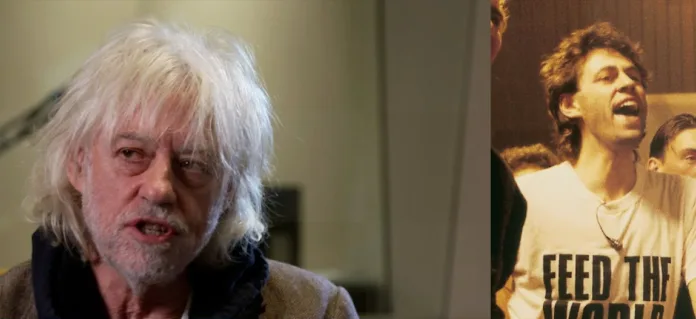As the 40th anniversary “ultimate mix” of do they know it’s Christmas? Drops, Ed Sheeran objects to his vocals being used, sparking a debate over the portrayal of Africa in the iconic charity single.
The release of the 40th anniversary “ultimate mix” of Band Aid’s Do They Know It’s Christmas? has reignited discussions surrounding the song’s portrayal of Africa, with some critics accusing it of perpetuating harmful stereotypes. The new megamix, which blends vocals from several versions of the charity single recorded over the years, sees George Michael duetting with Harry Styles and Chris Martin harmonising with the Sugababes.
However, the inclusion of Ed Sheeran’s vocals in the latest version has caused a stir. Sheeran, whose 2014 contribution to the song is featured in the new track, voiced his objections, explaining that he would not have allowed his vocals to be used had he been consulted about the direction the song was taking. The pop star shared his concerns on social media, pointing out that the narrative of the song had shifted, and that it no longer aligned with his views on how Africa should be represented in global media.
In response to Sheeran’s comments, Spandau Ballet’s Tony Hadley, who was part of the original 1984 recording, told BBC Radio 2 that he thought critics like Sheeran should “shut up.” Hadley argued that the song had always been about supporting those in need and that without efforts like Band-Aid, “nobody does anything to help anybody.” He added that the intention behind the charity single had always been “innocent,” and questioned whether critics would prefer nothing be done to support charitable causes.
Sheeran’s criticism stems from a broader debate about the portrayal of Africa in the song, which has been accused of reinforcing the notion of the “white saviour complex.” British-Ghanaian rapper Fuse ODG, who has long spoken out about the issue, argued that Do They Know It’s Christmas? presents a one-dimensional view of Africa, focusing solely on famine and poverty and portraying the continent as reliant on Western assistance. Sheeran shared ODG’s sentiments in his social media post, raising concerns about the song’s narrative and its potential to perpetuate damaging stereotypes.
Midge Ure, who co-wrote the original track, acknowledged the criticisms but defended the song’s intent. Speaking on Radio 2, Ure explained that Do They Know It’s Christmas? was never about portraying Africa negatively, but rather about highlighting the dire consequences of famine, war, and conflict, which were affecting millions at the time. “And the result is children who need food, who need medication, who need education,” he added. Ure also acknowledged the long-standing criticism of the song, which has been labelled as reinforcing the “white saviour” trope since its release in 1984.
The controversy also prompted Trevor Horn, the producer of the new megamix, to express regret over Sheeran’s objections, stating that he would have removed the singer’s vocals if he had known about the issue. Harvey Goldsmith, the Live Aid promoter who was also part of the Radio 2 discussion, offered a blunt response to Sheeran’s stance, remarking simply, “Stuff him.”
The latest version of Do They Know It’s Christmas? has garnered attention not just for its star-studded lineup, but also for bringing long-standing debates to the forefront once again. While the charity single has raised millions over the years for famine relief in Ethiopia and beyond, the evolving discourse surrounding its portrayal of Africa suggests that, for some, the song may no longer be seen as the straightforward act of charity it was once thought to be. Despite the controversy, Band-Aid’s legacy remains a significant chapter in the history of music and philanthropy. Yet, as discussions about representation and charity continue to evolve, Do They Know It’s Christmas? serves as a reminder of the complexities involved in global fundraising efforts and the impact that cultural perceptions can have on charitable initiatives
